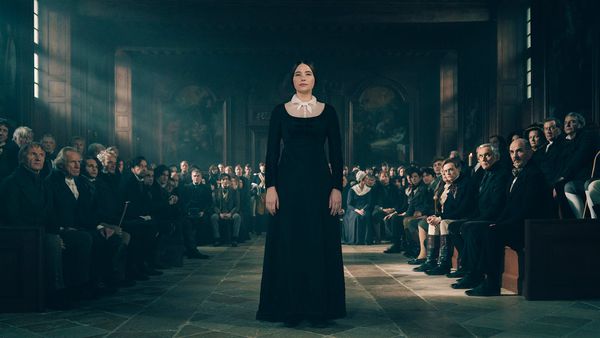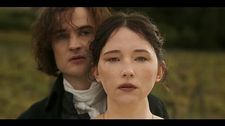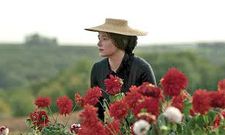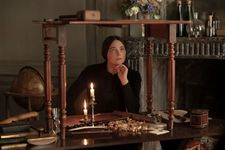 |
| Haley Bennett as the Widow Clicquot |
From Jawbone, the story of a down on his luck former youth boxing champion struggling with addiction, director Thomas Napper abruptly shifts his focus to 19th century France. Widow Clicquot, based on Tilar J Mazzeo's book of the same name, tells the story of the 'Grande Dame of Champagne,' Barbe-Nicole Ponsardin, played by Haley Bennett.
Her arranged marriage to François (Tom Sturridge) a young member of a winemaking family, is a union blessed by love. In the wake of his untimely death, the Widow Clicquot defies tradition and continues to run the fledgling wine business. Despite hostility from the other champagne makers, all men, she revolutionises the champagne business and becomes one of the great entrepreneurial women behind the Veuve Clicquot champagne brand.
 |
| Love at first sight |
In conversation with Eye For Film, Napper and Bennett discussed plucking, ironically, an iconic woman from obscurity and the need to remember the great women of history.
Paul Risker: In regard to women's history, where does Widow Clicquot fit into this conversation?
Haley Bennett: Two hundred years ago it was nearly impossible for a woman to achieve what Widow Clicquot achieved, but this is the first time her story is being told. It was an important distinction we wanted to make between the commercial and the branding aspect of the film. We wanted to bring forward a story of one woman's archetypical journey from being shy and timid, to an independent woman who was soulful and creative, and who found the strength to overcome tragedy and push back against her oppressors.
The female empowerment aspect is in the background. I know that's something everyone wants to push forward commercially, but to me, the story of the film is also about grief and righting the wrongs of the past. There is a very thin veil between grief and love, and without love, grief cannot exist. I think people will attach to the branding aspect of the film, but I was more interested in and compelled to tell a story about what motivates us to create, and I personally feel pain and loss can be a very powerful motivator. So, I wanted to tell the story about Barbe-Nicole, her heartbreak and abandonment, her grief and failures, and her need to bottle time so she could stand back and examine it.
Of course, there are themes such as mortality, patriarchy, nature and even more for her to contend with, but it's ultimately about a woman who discovers her own strength and purpose. […] I looked at it as a character study - this girl who is at first shy and timid, and then steps into her power, which is something I can really relate to, especially as an actor and now a producer.
PR: What adds to her captivating story is the wider historical context of the period, that saw one of France's great historical figures building his own mythology.
Thomas Napper: […] Just before we made Widow Clicquot, Ridley Scott was making Napoleon, which is an historical drama about a great icon and hero of French culture. I would say that it is a traditionally historical male biopic of a man rising through the ranks to become a general. It's a beautiful and epic film, but I rather take joy from the smallness of our film and the fact that it is about a woman [living and] working under Napoleonic ideology for much of the time. At one moment, the war literally arrives on her doorstep with cannons firing, but the war is somewhere else - it's other, it's outside our story.
 |
| Getting to know the land |
What the film focuses on is this incredible individual, who, as Haley said, is going through this wide range of experiences, emotions and ultimately emancipation. All in this one vineyard, in this one small place, which becomes her universe, and it becomes her metaphor for her marriage and her growth as a human being. Ultimately, an amazing icon is born out of her relentless pursuit of her vision or dream. Her story is no less valid than Napoleon's, ironically, and she's almost as famous as Napoleon in France and globally. How different their stories are, is why we need to have more stories about great women.
HB: And not just about a great woman. I want to validate what Thomas is saying about the need to shine a light on stories about successful and ambitious women. Widow Clicquot is certainly an icon in France, but in the US, unless you speak French, I don't think you'd know that "veuve" means "widow." So, why don't we know that it was a woman responsible for creating this empire? I think that's an exciting revelation.
PR: History often becomes whittled down to specific events, periods and the personalities that define it. Only when you appreciate the little stories, can you appreciate the bigger story. Widow Clicquot shows us this is important in championing women's stories.
TN: That's really a summation of what we were trying to say ourselves and speaking personally, I don't know whether I was necessarily thinking about those wider questions when we were making it. But I certainly felt it was a story I hadn't heard about, and so there was a beauty, as Haley said, in finding a character you don't really know.
We've all perhaps drunk Veuve Clicquot, but not known the culture and history behind it, and I certainly enjoy the relationship in the film with Moët and the other champagne houses that are trying to suppress, obstruct, and close her down.
Without giving away a spoiler, ultimately, one of the ideas or concepts behind the scene in the courtroom was to have her surrounded by men on all sides - this male industry that looked at a woman as incapable of producing something of quality. How funny is that now? It's so ironic, looking from the lens of the present, that life could be like that - impossible for women to have the vote, own property, have a bank account or a business. It's good to remind the audience of those restrictions and how important it was that those rights were won.
 |
| The drive to create |
HB: I was very interested in this woman, and obviously, her accomplishments are vast. When I think about my experience as a woman, I have often felt like I needed to hold a man's hand to get through certain things that I didn't think I could do by myself. Something I thought about a lot during the process of making this film, was holding my own hand and walking through the fire. And when I have felt terror or dread, to do the thing that I fear anyway. That is what has made me stronger, and it's not that I am fearless, but I'm proactive.
I have a vision, and I've learned something from every character I've played. This is one of the things I learned from Widow Clicquot, even though the story is antiquated. Our gender has come so far, and I'm continually impressed, but I still feel I need someone's hand to hold. When I think about Widow Clicquot's story, she held her own hand. She chose never to remarry, and she had mentors, but she never leaned on a man to get through those difficult aspects of her life.
I love the last image in the courtroom and how you chose to shoot and stage that, Thomas. There is an absolute barren space around her. Instead of feeling I needed to hold someone's hand, by the end of the film's arc (I'm getting emotional talking about it), I felt empowered to stand there. I didn't mean that she or I wasn't vulnerable and desperate to have a hug and reach out to someone to tell me it was going to be okay - that's why it felt quite emotional. It was a really beautiful space to exist in as Widow Clicquot and myself as a creator and as a woman - to stand there in my own power and be my own anchor. And that's why it feels relevant to me, which is ironic because she wears that anchor around her neck that her husband François gave her. It's funny that I only make that connection now. Barbe Clicquot learned to be her own anchor and even now, today, I have to constantly remind myself I am my own anchor.
Widow Clicquot is in US cinemas now.





















